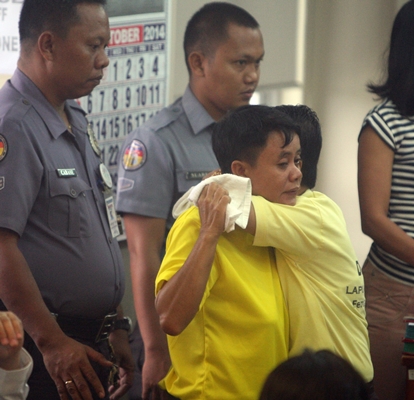
Sisters Shiela Santos 34 (right) hug her sister Lorna, 39, was convicted of human trafficking and meted life imprisonment. (CDN PHOTO/TONEE DESPOJO)
A woman from Marikina City who was accused of forcing women to work as prostitutes in Lapu-Lapu City was convicted of qualified trafficking.
Executive Judge Toribio Quiwag, in his ruling which was read in open court yesterday, ordered the incarceration of Lorna Valencia Santos for life and to pay the nine victims P2.6 million in damages.
Her younger sister, Shiela, was cleared by the court for “insufficiency of evidence”. Lorna’s father, Eduardo, and five other accused remain at large.
Eduardo is the registered owner of Hanna Valley, a bar used as a prostitution front, which was raided by authorities in June 3, 2008. A total of 50 victims were rescued, three of them were minors.
The victims claimed that customers would pay a bar fine of P1,500 to P4,000 so they could be taken out for sex.
Regardless of the amount that the bar collects from customers, the victims would only get P500.
Siblings Lorna and Shiela were arrested by agents of the National Bureau of Investigation (NBI) in December 2010 by virtue of an arrest warrant in connection with the 2008 bar raid. They have been in detention at the Lapu-Lapu City Jail for three years while undergoing trial.
At yesterday’s promulgation, the siblings were emotional and hugged each other tight after the verdict was read to them.
“Ang sakit. Wala naman talagang ebidensya laban sa amin. Bakit ako hinatulan ng ganito? (It’s so painful. They don’t have enough evidence against us. Why did they do this to me?),” Lorna told reporters before she was taken back to jail.
“Pero ano pa ang magagawa ko? Dapat tanggapin ko na lang. (But what else can I do? I just have to accept the court’s decision),” she added.
The two accused were represented by lawyer Wendell Quiban who took over the case after Noel Archival was killed in February this year.
“Sa ngayon, wala pa kaming plano kung ano ang dapat naming gawin. (For now, we still don’t have any plans on what to do after the court made a ruling),” she added.
Denial
Lorna and Shiela left Marikina City and headed for Cebu after their mother died in 1996.
Lorna said she opened a sari-sari store and an eatery in Lapu-Lapu City while her sister worked as a driver.
They denied having sold women for sex.
“Hindi naman yan ginawa (We never did that),” Lorna said.
In his ruling, Judge Quiwag gave weight to the victims’ identification of Lorna as one of the managers of the brothel.
“The prosecution has built a strong case against Lorna Santos. The denial interposed by the accused cannot prevail over the strong declaration of prosecution witnesses that she took part in the management of Happy Valley,” he said.
Quiwag, however, didn’t find sufficient basis to convict Lorna’s sister Shiela who was accused by the victims for managing a brothel.
“Shiela was only seen talking to Lorna and other managers of Hanna Valley. This alone is not sufficient to indict her in this case. As to the other casa (brothel) which Shiela allegedly managed, it is immaterial in this case,” the judge said.
Quiwag deemed it proper to fine Lorna in recognition of the victim’s agony under the hands of the accused.
“Moral damages are designed to alleviate in some way the victim’s mental anguish, fright, serious anxiety, besmirched reputation, wounded feelings, moral shock, social humiliation, and similar injury,” he said.
Big step
Lawyer Jesse Rudy, the national director of the International Justice Mission (IJM) in the Philippines, lauded the NBI, state lawyers, and other government agencies in working hand in hand with the organization in the fight against human trafficking.
“Convictions like this are necessary if we are going to ultimately end trafficking here in Cebu. This is a big step. This should send a good message out to the commununity that there are significant penal consequences for engaging in trafficking. It doesn’t matter how long it takes. Justice will eventually come,” he said.
Rudy, along with Regional State Prosecutor Fernando Gubalane, and other IJM officers were present during yesterday’s promulgation.
Gubalane said there will be no let up in their campaign to stop human trafficking in Cebu as well as in other parts of the country. “There’s a law which provides penalties against those involved in human trafficking. We shall continue the campaign. And we’re sending a message that jsutice will be served for those who fell prey to traffickers,” he said.
Human trafficking is committed by anyone who “recruits, transports, transfers, harbors, provides or receives a person, with or without the victim’s consent or knowledge, by any means, including those done under the pretext of domestic or overseas employment or training or apprenticeship, for the purpose of prostitution, pornography, sexual exploitation, forced labor, slavery, involuntary servitude or debt bondage.”
An offense is considered “qualified” if the victim is a child or in other situations involving family relations or a relationship of authority.
Based on data of the International Justice Mission (IJM), a total of 530 victims of sex trafficking were rescued by law enforcers in Metro Cebu from 2004 to 2013.
Related Stories:
‘Human trafficking not rampant in Central Visayas’
Tourism without trafficking
Why human trafficking happens